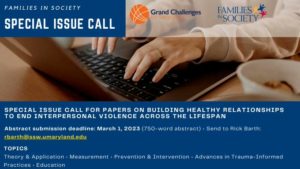Abstract submission deadline: March 1, 2023 Manuscript submission deadline: June 30, 2023

Special Issue Overview (Spring 2024 Publication)
The Grand Challenge to Build Healthy Relationships to End Violence is calling for scholarship to illuminate additional ways to understand, measure, and operationalize relationship-strengthening strategies to prevent and respond to intimate partner violence and child maltreatment.
This special issue seeks to clarify the opportunities and limitations of approaches that center relationships as a key element in reducing and preventing violence. In particular, we seek papers that examine non-carceral interventions and offer a greater service array for those who experience and use violence. The issue will give special consideration to papers that “connect the dots” between types of interpersonal violence and how they may yield additional involvement of violence—even across generations (e.g., children who are maltreated using violence toward their own children or becoming involved with elder abuse). Given the importance of approaching violence in families from an intersectional, feminist, and sociocultural framework, papers must include discussion of influences of race, ethnicity, culture, class, and gender in the theory, study methodology, and conclusions.
Topic Categories
- Theory and application that provides understanding of the development of healthy relationships, and the unfolding of healthy relationships to interrupt the intergenerational transmission of violence, across the lifespan. Papers that suggest key prevention opportunities across life stages are especially encouraged. Identification of the influence of trauma and race-related stress on individuals and relationships are welcome.
- Measurement work, both quantitative and qualitative in nature, to clarify the features of relationships that promote non-violence and equality. This includes examinations of risk and protective factors, as well as safety and risk management for those who continue in relationships where violence has occurred. Additional topics: how to assess and build healthy relationships, including the utility to assess progress on relationship strengthening and safety planning.
- Prevention and intervention studies that identify and address environmental and relationship risk and protective factors to prevent the occurrence, recurrence or acceleration of violence are sought.
- Advances in trauma-informed practices using relationship-strengthening approaches, such as training for parents, family therapy, peer interventions, mediation, mentoring, relationship coaching, mediation, financial coaching, couples counseling, cross-racial counseling and restorative practices (face-to-face or online, with individuals or groups). These include approaches that may be an alternative to, or supplement for, conventional batterer’s intervention programs.
- Education about violence prevention and intervention for helping professionals and for individuals who are in / who plan to be in relationships. Andragogical approaches to teaching about relationship strengthening in ways that include assessment of the risk of serious and lethal violence are needed. Information about interdisciplinary or inter-agency efforts to include social workers and other human services professionals along with law enforcement are encouraged.
Cultural, racial, and gender influences on relationship dynamics and emerging adaptations of practice affect all of these areas and should be addressed, as feasible in each submission.
Guidelines and Instructions
Interested authors should first provide a 600–750 word abstract, with a subsequent invitation for accepted abstracts to submit a completed manuscript. Manuscripts must be prepared according to the journal’s Submission Guidelines (see https://journals.sagepub.com/author-instructions/FIS).
In addition to full manuscripts, a special section of short papers (750–1250 words) will be included that describe “Emerging Innovations in Practice to Strengthen Relationships.” This will allow for practice approaches that have not yet been thoroughly studied to gather some recognition.
Manuscripts will be peer-reviewed within 30 days of submission by the leadership of the Grand Challenge for Building Healthy Relationships leadership network (see below) and interdisciplinary colleagues deemed to be most expert for the review. Supervised doctoral and post-doctoral students will be engaged as “Invited Reviewers” to complement the reviews by faculty in the Grand Challenges network. Papers with authors who collaborate closely with any of members of the leadership network will be assigned to more distant reviewers.
| Abstract submission deadline: March 1, 2023 (750-word abstract) • Send to Rick Barth: rbarth@ssw.umaryland.edu
Manuscript submission deadline: June 30, 2023 • Submission portal: https://mc.manuscriptcentral.com/fis |
Building Health Relationships Leadership Network
Lead Co-Editors
- Samuel Aymer, PhD, MSW, City Univ. of New York
- Megan Holmes, PhD, MSW, Case Western Reserve Univ.
- Richard P. Barth, PhD, MSW, Univ. of Maryland
Network Leads to Serve as Reviewers
- Todd Herrenkohl, Univ. of Michigan
- Michelle Johnson-Motoyoma, Ohio State Univ.
- Melissa Jonson-Reid, Washington Univ.
- Patricia Kohl, Washington Univ.
- Shanti Kulkarni, UNC Charlotte
- Jill Messing, Arizona State Univ.
Contact
- Rick Barth: rbarth@ssw.umaryland.edu, (410) 382-4483 mobile • (410) 706-3371 office
- Kira Silk: kira.silk@ssw.umaryland.edu (Director of the Grand Challenges for Social Work)
